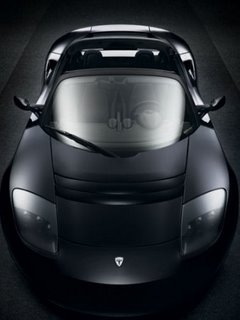 The Tesla Roadster, powered by more than 6,800 lithium-ion batteries, can go zero to 60 mph in about four seconds. Top speed: 130 mph. This car is fast and smokeless.
The Tesla Roadster, powered by more than 6,800 lithium-ion batteries, can go zero to 60 mph in about four seconds. Top speed: 130 mph. This car is fast and smokeless.Below is an article written by Joshua Davis Wired Mag.
Martin Eberhard holds the brake down with his left foot and presses on the accelerator with his right. The motor revs, the car strains against the brake. I hear ... almost nothing. Just a quiet whine like the sound of a jet preparing for takeoff 5 miles away. We're belted into a shimmering black sports car on a quiet, tree-lined street in San Carlos, California, 23 miles south of San Francisco. It has taken Eberhard three years to get this prototype ready for mass production, but with the backing of PayPal cofounder Elon Musk, Google's Larry Page and Sergey Brin, and ex-eBay chief Jeff Skoll, he has created Silicon Valley's first real auto company.
"You see any cops?" Eberhard asks, shooting me a mischievous look. The car is vibrating, ready to launch. I'm the first journalist to get a ride.
He releases the brake and my head snaps back. One-one-thousand: I get a floating feeling, like going over the falls in a roller coaster. Two-one-thousand: The world tunnels, the trees blur. Three-one-thousand: We hit 60 miles per hour. Eberhard brakes. We're at a standstill again -- elapsed time, nine seconds. When potential buyers get a look at the vehicle this summer, it will be among the quickest production cars in the world. And, compared to other supercars like the Bugatti Veyron, Ferrari Enzo, and Lamborghini Diablo, it's a bargain. More intriguing: It has no combustion engine.
The trick? The Tesla Roadster is powered by 6,831 rechargeable lithium-ion batteries -- the same cells that run a laptop computer. Range: 250 miles. Fuel efficiency: 1 to 2 cents per mile. Top speed: more than 130 mph. The first cars will be built at a factory in England and are slated to hit the market next summer. And Tesla Motors, Eberhard's company, is already gearing up for a four-door battery-powered sedan.
In an age when a car's electronics are worth more than its steel, it seems only natural that the tech sector would have its own car company. The question is, can Eberhard turn the digital era into horsepower, torque, and rpm?
Eberhard has never designed a car and has no experience building one. He created the Rocket eBook, a handheld digital book reader that came to market in the late '90s. But he insists his eBook background is relevant to starting a car company. The device used a rechargeable battery, and Eberhard -- an electrical engineer -- devoted himself to maximizing run time and minimizing weight. In 2000, his venture, NuvoMedia, was bought by TV Guide's parent company, which quickly abandoned the product.
But Eberhard was flush with cash and decided to buy himself a new sports car. He wanted something that was fast but still got good mileage. He quickly learned that high performance and fuel efficiency are mutually exclusive, at least when it comes to internal combustion engines. So he started researching alternative technologies and soon realized it was actually possible for an electric car to combine zip and efficiency. The problem: Nobody was making one. The EV1, General Motors' electric car, had failed, in part because it was expensive and poorly marketed. Most crippling, though, was the underperformance of the original lead-acid batteries and even the second-gen nickel metal hydride cells. Consumers wanted a vehicle that had a range greater than the EV1's (at best) 130 miles. The common wisdom was that batteries just weren't there yet.
But what did Detroit know about batteries? Eberhard had squeezed 20 hours of run time out of the little power pack on his eBook. Battery efficiency was an obsession among computer engineers, who were extracting more power from ever-smaller cells with each generation of laptops. GM seemed oblivious to the lessons emerging from the electronics industry. Eberhard began to think that if anybody was going to build a viable electric car, it would be a Silicon Valley engineer. Then, after reading biographies of John DeLorean and Preston Tucker, and reminding himself that launching a car company was a crazy idea, he did just that.
for info visit http://www.teslamotors.com/Cool eh
Ciao
Satnam

No comments:
Post a Comment